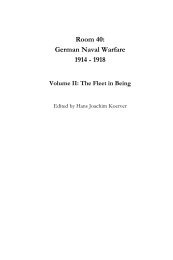German Submarine Warfare 1914-1918 in the Eyes - British Naval ...
German Submarine Warfare 1914-1918 in the Eyes - British Naval ...
German Submarine Warfare 1914-1918 in the Eyes - British Naval ...
Create successful ePaper yourself
Turn your PDF publications into a flip-book with our unique Google optimized e-Paper software.
On a typical day like 7 May 1915, <strong>the</strong> follow<strong>in</strong>g ocean-go<strong>in</strong>g submar<strong>in</strong>es were<br />
<strong>in</strong> <strong>the</strong> Atlantic on merchant war cruises:<br />
• U-9 off <strong>the</strong> East coast of England<br />
• U-20 off <strong>the</strong> Irish south coast<br />
• U-27 third day out somewhere <strong>in</strong> <strong>the</strong> nor<strong>the</strong>rn North Sea<br />
• U-30 return<strong>in</strong>g from a cruise <strong>in</strong> <strong>the</strong> Atlantic, two days before reach<strong>in</strong>g base<br />
• U-36 between Scotland and Norway<br />
• U-39 off <strong>the</strong> Scottish coast<br />
U-26 was on patrol aga<strong>in</strong>st <strong>the</strong> Russians <strong>in</strong> <strong>the</strong> Baltic.<br />
Merchant ships sunk:<br />
• Lusitania, 30,396 BRT, passenger steamer, torpedoed without warn<strong>in</strong>g by<br />
U-20; 1,198 dead.<br />
• Benn<strong>in</strong>gton, fish<strong>in</strong>g vessel of 131 BRT, sunk by gunfire by U-39 accord<strong>in</strong>g to<br />
prize rules, no losses.<br />
Such was a typical day dur<strong>in</strong>g <strong>the</strong> first unrestricted war phase <strong>in</strong> 1915, when<br />
four submar<strong>in</strong>es cruised <strong>the</strong> <strong>British</strong> Isles. U-boats were not yet viewed as a deadly<br />
menace. Their presence was virtually dismissed as a <strong>German</strong> propaganda bogyman<br />
to distraction attention away from <strong>the</strong> failure of <strong>the</strong> battleship fleet.<br />
<strong>German</strong> <strong>Submar<strong>in</strong>e</strong> <strong>Warfare</strong> 1916<br />
Almost two years <strong>in</strong>to <strong>the</strong> war, <strong>the</strong> army had become around to support<strong>in</strong>g<br />
unrestrictive warfare. “[Chief of Staff, Erich von Falkenhayn, said <strong>in</strong> Mid April, 1916] that<br />
<strong>the</strong> recent results would let it be presumed, that unrestricted submar<strong>in</strong>e warfare causes eight to ten<br />
times more s<strong>in</strong>k<strong>in</strong>gs, and that he feels absolutely sure England would f<strong>in</strong>ally be ready for peace<br />
with<strong>in</strong> three months.” 48<br />
The army actually did not depend on navy numbers. 49 In fact, <strong>the</strong> navy used<br />
published s<strong>in</strong>k<strong>in</strong>g numbers to ga<strong>in</strong> public support for unrestricted submar<strong>in</strong>e<br />
warfare by present<strong>in</strong>g <strong>the</strong> submar<strong>in</strong>e as a Wunderwaffe. Pressure on <strong>the</strong> government<br />
grew immensely. Reasonable statesmen like Bethmann-Hollweg, opposed to<br />
unrestricted submar<strong>in</strong>e war, were publicly vilified as “English allies.” In fact,<br />
exaggeration had obscured <strong>the</strong> truth. Out where <strong>the</strong> war was be<strong>in</strong>g prosecuted <strong>in</strong><br />
1916 <strong>the</strong>re were no s<strong>in</strong>k<strong>in</strong>gs <strong>in</strong> October followed by a modest 226 BRT score <strong>in</strong><br />
November and a heftier 15,000 BRT by U-24 and UB-10 <strong>in</strong> December. By January<br />
of <strong>the</strong> follow<strong>in</strong>g year eight small fish<strong>in</strong>g vessels by UB-6, UB-16, and UB-17 <strong>in</strong> <strong>the</strong><br />
North Sea; one lone steamer of 1,058 BRT by UB-18 <strong>in</strong> <strong>the</strong> Channel chalked up a<br />
comb<strong>in</strong>ed total of 1,447 BRT for <strong>the</strong> month. In February, 1916 three fish<strong>in</strong>g<br />
48 Afflerbach, Falkenhayn, p. 392: Treutler to Chancellor Bethmann-Hollweg regard<strong>in</strong>g a discussion<br />
with Falkenhayn on or before 14 April 1916. Translation by <strong>the</strong> editor.<br />
49 It has been argued that Falkenhayn hoped to use <strong>the</strong> suspension of unrestricted warfare to<br />
exonerate <strong>the</strong> army <strong>in</strong> <strong>the</strong> event <strong>the</strong> battle of Verdun did not end <strong>in</strong> his favour. Failure <strong>in</strong> <strong>the</strong> field<br />
would be attributed to <strong>the</strong> unh<strong>in</strong>dered resupply of <strong>British</strong> ammunition transports for <strong>the</strong> French<br />
Army. It is an <strong>in</strong>terest<strong>in</strong>g rumour, only.<br />
xxvii




